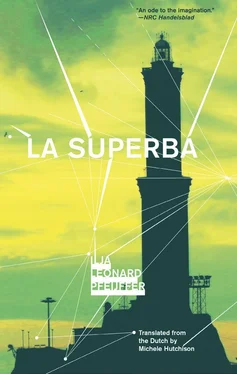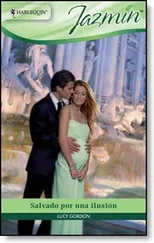The good news is that we won. The judge ruled in our favor on all the points. The strategy of Stefania Volpedo, Attorney at Law, J.D., worked perfectly. The claim was ruled inadmissible. The great Antonio Bentivoglio hadn’t even prepared a rebuttal. He waived his right to plead his own case. He simply smiled. It was almost too easy, Stefania said. It was too easy.
Just before the sitting was adjourned, he spoke. For two seconds. He announced that he would be appealing against this ruling on behalf of his client.
I asked her what it meant. She is convinced that any court of appeal would endorse the verdict. The Parodis can litigate their way to the Supreme Court or the European Court with their star lawyer if they want, but this first judge’s line of reasoning will be adopted everywhere. Stefania is completely sure of this. And I believe her. We will win.
I asked her whether it meant that the Parodis will have to pay the litigation costs. So here comes the bad news. Stefania explained to me that if the case goes to appeal there’s no definitive ruling. And without a definitive ruling, there’s no winner or loser. And without a winner and a loser, there’s no certainty about who is going to be responsible for the costs. We’ll definitely win, but we haven’t won yet. I asked her how long it might take in her professional opinion. She reflected. “A week or two?” I asked. “Three weeks, perhaps?”
She looked uncomfortable. “Maybe a bit longer,” she said.
“How much longer?”
“You have to understand that Italy is a constitutional state. Lawsuits take time.”
“How much time? A month?”
“About seven years.”
“Seven years?”
“If we don’t have to go to the Supreme Court. We’ll leave the European Court aside. But don’t worry. We’ll definitely win.”
“And how much will that cost?”
“I’ll charge the same hourly rate to the bitter end, I promise you. I’m grateful to you for giving me this case. I owe you one.”
31.
In October of the year 1347, twelve merchant ships sailed into Messina harbor in Sicily bearing the white flag with the red cross. They were part of the Genoese fleet that regularly used this harbor. But the spectators ashore soon noticed that this was no routine visit. The ships were behaving oddly. They were sailing more slowly than usual. The oars were moving irregularly. Some of them weren’t being used at all, and because the number of oars being used on port and starboard wasn’t the same, some of the ships continuously seemed to be drifting off course. They were swerving dangerously to one side until the helmsman compensated with the rudder. They swayed into the harbor like twelve drunkards. A few times they only just managed not to crash into each other. The Sicilians grew suspicious. Genoa had the best fleet in the Mediterranean. The discipline of the Genoese crew was legendary. Something very strange was going on. To be on the safe side, they drafted in halberdiers to wait for the ships and their crews on the quayside.
When the ships had finally managed to dock and the Sicilian soldiers boarded them to find out what was going on, they found a situation much worse than their grave suspicions. Most of the crew were critically ill. They had black lumps in their armpits and groins, some as big as an egg, some even as big as an apple. Blood and pus seeped from them. The stench was unbearable. Many of them had black spots on their skin. They had a fever and were suffering terribly. Several dozen seamen had already died. They hung lifelessly over their oars.
They came from Caffa, one of the captains said, coughing up blood. It was one of the most important trading posts for the Genoese. The city was in the Crimea, on the Black Sea, and was the end station of the Silk Road. A few months previously the city had been besieged by Kipchaks, Tatar soldiers from the Golden Horde’s Khanate. At a certain point, they’d begun to catapult the dead bodies of their own men over the city wall. They had died of a horrible sickness. They were covered in lumps and black spots. It didn’t take long for the inhabitants of Caffa to begin to show the same symptoms. The illness spread rapidly; within a few days half of the city was sick. Most of the people who were infected were dead within five days. There was hardly any time to burn the bodies. There were rumors of doctors who became infected visiting a patient and died first. People going to bed healthy could be dead the next morning from the boils and bruises. When the first soldiers in the Genoese garrison died, they fled with these twelve ships.
The Sicilians disembarked the survivors and put them in quarantine. The doctors could do little more than provide them with brandy, willow bark, dried myrtle leaves, and other painkillers. Within a few days, they’d all died. They burned the bodies and disinfected the ships with sulfur and smoldering sage branches. They’d have preferred to sink them but messengers from the north had already announced that the Genoese wanted their ships back. And Genoa was a powerful ally. They couldn’t ignore her requests.
The ships sailed into Genoa harbor a week later with Sicilian crews. They were suitably rewarded and spread across various ships with different trade missions so they could return to Messina. None of them showed any symptoms of the mysterious illness. The crisis seemed to have been averted.
But no one saw a black rat emerge from the hold of one of the ships and run along the black cable with which the ship was moored to the quay, in search of food. And no one saw a second rat follow it, and after that dozens of others from the other ships. The quayside always provided for scavengers. It was covered in fishing waste and other garbage. And from the harbor they disappeared into the caverns of the city.
A few days later, the first Genoese began to display lumps in their armpits and groins, as big as an egg or an apple, oozing pus and blood. Their skin turned black. The illness spread rapidly. Within no time, half the city was sick. Some were dead within five days. There was hardly any time to bury the bodies. And from Genoa, the sickness spread across Liguria, Piemonte, and the rest of Europe. The Black Death would be responsible for millions of victims in the fourteenth century and decimated Europe’s population.
32.
And the letter you were so kind as to forward to me didn’t contain good news, either, but I suspect you already knew that, if only because of the emphatic “open immediately” printed on the reassuringly lavender-colored envelope. It was an official notification from the tax authorities back home. They refer to arrears built up over the previous years. There’s also the matter of a new tax assessment for the past calendar year. This all adds up to a sum I couldn’t cover even if they impounded my belongings. If I were still back home, this tax bill would make me technically bankrupt.
I’m busy preparing my response. Every writer of repute has written a long letter to the Inspector of Direct Taxes at some point in their lives. I will explain at length why I merit special status. I will address my contributions to the cultural climate in my fatherland and in a hilarious manner I will calculate to the last cent the various ways in which the bureaucracy is doing me, culture, and humanity a disservice. I will compose an anticipatory ode to the inspector, immortalizing him. I will praise his literary taste and compare him favorably to his fellow inspectors from other districts who, unlike him, are only interested in the banality of bookkeeping and the wheel trims on their company cars, while I will ascribe to him alone the power of discernment that will allow him to write history.
Perhaps, if I do my utter best, my letter to the Inspector of Direct Taxes will please my publisher. Perhaps he will publish it in a small edition. Perhaps I could wheedle a nice advance for it. Because just like my illustrious predecessors in the genre, I am under no illusion that, aside from an eventual publication and the obligatory chapter in an eventual biography, I will make any profit. In the most likely scenario, I can count myself lucky if I can sell my letter to the Inspector of Direct Taxes, the truest and most autobiographical document that I have ever written, as a curiosity to a literary magazine like The Lying Dog or The Barren Rabbit . After which my belongings will be impounded.
Читать дальше












